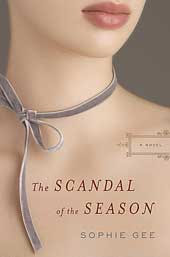The Scandal of the Season
 The Scandal of the Season is set in London in 1711, and details the events that led to Alexander Pope writing the classic poem The Rape of the Lock. Now, to many who don't know Alexander Pope, or only dimly remember the poem from their undergraduate days, that may sound dull. And, I must admit, the first few chapters, while engaging as they deal with the social mores of the elite class of the time, didn't exactly grip me in a spell. But then I was taken by surprise, as this novel turns into a very effective erotic thriller. And when I say erotic, I mean hot stuff.
The Scandal of the Season is set in London in 1711, and details the events that led to Alexander Pope writing the classic poem The Rape of the Lock. Now, to many who don't know Alexander Pope, or only dimly remember the poem from their undergraduate days, that may sound dull. And, I must admit, the first few chapters, while engaging as they deal with the social mores of the elite class of the time, didn't exactly grip me in a spell. But then I was taken by surprise, as this novel turns into a very effective erotic thriller. And when I say erotic, I mean hot stuff.The author, Sophie Gee, is a professor of English at Princeton University and teaches Pope, and you can almost smell the must of library stacks, as she has clearly done extensive research. But who would have expected that this subject, which makes one think of the tweed and ivy of universities, would be so forthright about sex? Still waters obviously run deep.
Alexander Pope, as the novel begins, was a young man who aspired to be a great poet. He was deformed by illness, and was self-conscious about it (and knew deep down he would never find the love he desired). He leaves his home in the country and takes residence with a friend in London, as do neighbor sisters, Theresa and Martha. Pope has a thing for Theresa, but it is Martha who really cares for him. It should also be pointed out that they are all Catholics, which was a minority in England, and who are viewed with some suspicion, as there is a faction of Catholics, called Jacobites, who want to restore a Catholic king to the crown.
The sisters have a cousin, Arabella Fermor, who is one of the most beautiful women in London, but is hampered by not being wealthy enough to attract a royal suitor. She does catch the eye of Lord Petre, a dashing baron who happens to be Catholic. Petre ends up making Arabella his mistress, and she believes that he will marry her. But Petre is caught up in Jacobite intrigue, and things don't turn out the way they want. Thus, this leads to the event of the poem, a mock-epic which describes, in couplets, how Petre takes a snip of Arabella's hair at a ball, which thus humiliates her.
There is a lot to enjoy in this novel, once accustomed to its language and rhythms. For one thing, how lovely to spend time with people who speak so elegantly, and take pride in their witticisms. Also, what a time to have lived in when poets were celebrities. Also, the traditions and protocols of courtship and social gatherings are so intricate, yet Gee has a thorough knowledge of them and makes sure her readers understand every nuance.
And then there are the sex scenes. It's always a risk for a literary novelist to tackle play-by-play erotic adventures. I've read and written a lot of erotica, and when it's placed in a context where it's not expected it can sometimes seem awfully silly. Not so here. Not only is it well-written, but it's also stimulating.
Helpfully, Pope's poem is included in an addendum, although I must admit I find it tough sledding, even after having read the book. Still, I would recommend anyone that is taking a course in eighteenth-century British literature to read this book. It may give you information that helps lay the groundwork, and it may also make you blush.


Comments
Post a Comment